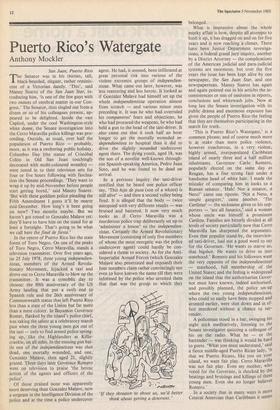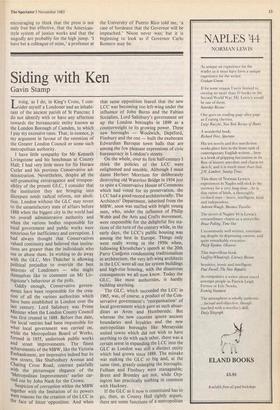Puerto Rico's Watergate
Anthony Mockler
black-bearded, elegant, rather reminis- cent of a Victorian dandy. 'This', said Manny Suarez of the San Juan Star, in- troducing him, 'is one of the few guys with two ounces of cerebral matter in our Con- gress.' The Senator, thus singled out from a dozen or so of his colleagues present, ap- peared to be delighted. Inside the vast Capitol, under the cool Washington-style white dome, the Senate investigation into the Cerro Maravilla police killings was pro- ceeding. Outside, as usual, over half the population of Puerto Rico — probably, more, as it was a sweltering public holiday, Columbus Day (the statue of Cristobal Colon in Old San Juan touchingly decorated with multi-coloured wreaths) were tuned in to their television sets for four or five hours following with fascina- tion the Senate proceedings. 'They want to wrap it up by mid-November before people start getting bored,' said Manny Suarez. 'But with these goddam police pleading the Fifth Amendment I guess it'll be nearer mid-December. How long's it been going on now? Two months maybe. But we haven't got round to Gonzalez Malave yet: they'll have to have him on the stand for at least a fortnight. That's going to be what we call here the final de fiesta.'
In the centre of Puerto Rico lies the state forest of Toro Negro. On one of the peaks of Toro Negro, Cerro Maravilla, stands a television transmitter. Over five years ago, on 25 July 1978, three young independien- tistas, members of the Armed Revolu- tionary Movement, hijacked a taxi and drove out to Cerro Maravilla to blow up the transmitter. It was a symoblic day to choose: the 80th anniversary of the US Army landing that put a swift end to Spanish rule and the 26th anniversary of Commonwealth status that left Puerto Rico less than a state of the Union but far more than a mere colony. In Bayamon Governor Romer, flanked by the island's police chief, was taking the salute at a celebratory march past when the three young men got out of the taxi — only to find armed police spring- ing up, like the Highlanders at Killie- crankie, on all sides. In the ensuing gun bat- tle one of the independientistas was shot dead, one mortally wounded, and one, Gonzalez Malave, then aged 21, slightly grazed. Three days later Governor Romero went on television to praise 'the heroic action of the agents and officers of the police'.
Of those praised none was apparently more deserving than Gonzalez Malave, now a sergeant in the Intelligence Division of the police and at the time a police undercover
agent, He had, it seemed, been infiltrated at great personal risk into various of the violent extremist groups of independien- tistas. What came out later, however, was less reassuring and less heroic. It looked as if Gonzalez Malave had himself set up the whole independientista operation almost from scratch — and various minor ones preceding it. It was he who had overruled his companeros' fears and objections, he who had procured the weapons, he who had held a gun to the head of the taxi-driver. It also came out that it took half an hour longer to get the mortally wounded in- dependientista to hospital than it did to drive the slightly wounded undercover agent there. The dying youth, aged 18, was the son of a novelist well-known through- out Spanish-speaking America, Pedro Juan Soto, and he was found to be dead on arrival.
In a previous inquiry the taxi-driver testified that he heard one police officer say, 'This hijo de puta (son of a whore) is still alive' — and then a second volley being fired. It is alleged that the body — twice autopsied with very different results — was bruised and battered. It now very much looks as if Cerro Maravilla was a murderous police trap deliberately set up to 'administer a lesson' to the independien- tistas. Certainly the Armed Revolutionary Movement (consisting of only five members of whom the most energetic was the police undercover agent) could hardly be con- sidered a threat to society. As for the Anti- Imperialist Armed Forces (which Gonzalez Malave also penetrated and exposed) their four members claim rather convincingly not even to have known the name till they were informed by the police who arrested them that that was the group to which they
'If they threaten to shoot us, we'd better think about getting a deterrent.' belonged.
What is impressive about the whole murky affair is how, despite all attempts to hush it up, it has dragged on and on for five years and is now reaching a climax. There have been Justice Department investiga- tions, a federal grand jury inquiry, another by a District Attorney — the complications of the American judicial and para-judicial systems are enormous. but over the five years the issue has been kept alive by one newspaper, the San Juan Star, and one newspaperman. Manny Suarez has again and again pointed out in his articles the in- consistencies or sins of omission in reports, conclusions and whitewash jobs. Now at long last the Senate investigation with its public drama and enormous exposure has given the people of Puerto Rico the feeling that they are themselves participating in the search for truth.
'This is Puerto Rico's Watergate,' is a common phrase; and of course much more is at stake than mere police violence, however treacherous, in a very violent, highly armed, overpopulated Caribbean island of nearly three and a half million inhabitants. Governor Carlo Romero, popularly elected on the same day as Reagan, has a fine strong face under a handsome head of white hair. I made the mistake of comparing him in looks to a Roman senator. 'Hah! Not a senator, a Nero!' came one riposte. 'Not a Nero, a simple gangster,' came another. 'The Carlistas' — the nickname given to his sup- porters — 'are all fanatics,' said a woman whose uncle was himself a prominent Carlista. Families are bitterly divided at all levels of society particularly now that Cerro Maravilla has sharpened the arguments. Even that populist stand-by, the interview- ed taxi-driver, had not a good word to say for the Governor. 'He wants to starve us, that bigshot. He wants to drive us into statehood.' Romero and his followers want the very opposite of the independientistas — statehood, full membership of the United States; and the feeling is widespread on the island that the authoritarian Gover- nor must have known, indeed authorised, and possibly planned, the police set-up where the two young independientistas, who could so easily have been stopped and arrested earlier, were shot down and in ef- fect murdered without a chance to sur- render.
A policeman stood in a bar, swinging his night stick meditatively, listening to the Senate investigator quizzing a colleague of his on the radio. What he — or the bartender — was thinking it would be hard to guess. 'What you must understand,' said a fierce middle-aged Puerto Rican lady, 'Is that we Puerto Ricans, like you on your island, we want fair play. Cerro Maravilla was not fair play. Even my mother, who voted for the Governor, is shocked by the beatings and bruisings and killings of these young men. Even she no longer believes Romero.'
In a society that in many ways is more Central Amercian than Caribbean it seems encouraging to think that the press is not only free but effective, that the American- style system of justice works and that the ungodly are probably for the high jump. 'I have bet a colleague of mine,' a professor at
the University of Puerto Rico told me, 'a case of bordeaux that the Governor will be impeached.' Nixon never was; but it is beginning to look as if Governor Carlo Romero may be.















































 Previous page
Previous page